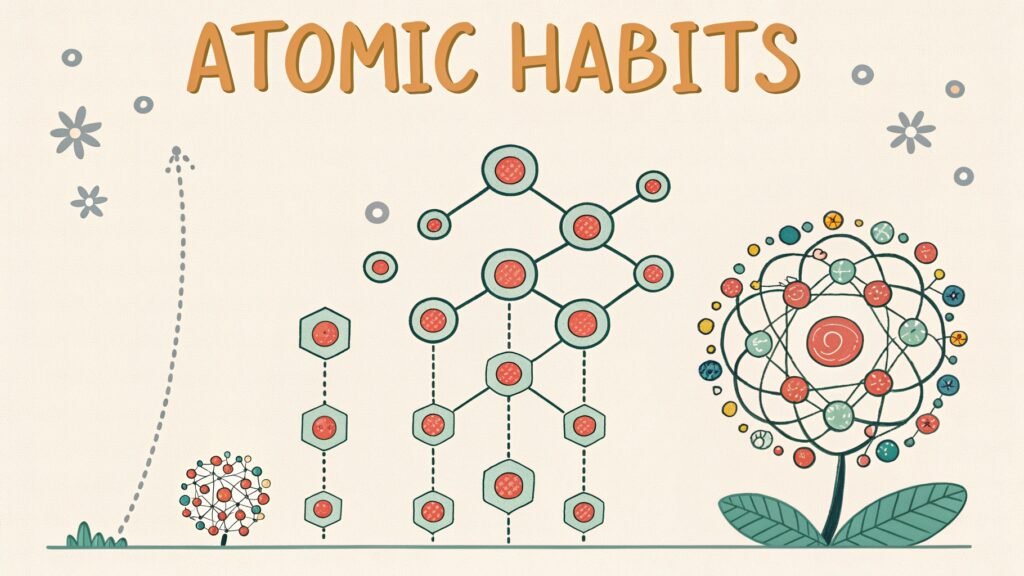Atomic Habits: How Tiny Changes Lead to Big Success

Table of Contents
ToggleIntroduction to Atomic Habits
The concept of “Atomic Habits” revolves around the idea that small, incremental changes in behavior can lead to profound improvements over time. Developed by James Clear, this framework emphasizes the idea that habitual actions are the fundamental units of success. Rather than relying on drastic transformations, Clear posits that focusing on minor adjustments can yield significant results, ultimately shaping an individual’s identity and trajectory.

At its core, the term “atomic” signifies something tiny, yet powerful. This analogy highlights how minute behaviors, when accumulated, create radical improvements in various aspects of life, including health, productivity, and personal development. For instance, committing to reading just a few pages of a book each day can eventually lead to completing an entire library over the years. This cumulative effect showcases the potential of atomic habits to foster success through consistent, manageable efforts.
The essence of Atomic Habits lies in the understanding that habits form the building blocks of our daily lives. They dictate how we respond to situations and influence our mindset. By consciously developing positive atomic habits and encouraging their repetition, individuals can reshape their routines and, consequently, their lives. Clear provides a comprehensive framework detailing the habit formation process, emphasizing the importance of cues, cravings, responses, and rewards in this cycle.
This approach not only underscores the significance of small changes but also offers practical strategies for implementing and sustaining these habits. By focusing on these manageable adjustments, individuals can embark on a journey that leads to long-term growth and achievement, proving that success does not necessarily stem from grand gestures, but rather from the power of tiny changes.
👉 Helpful Tip Style
Going through emotional turmoil and want to find peace?
Looking for a proven fast-track for keeping your emotions in balance?
Open to a new perspective that gives you emotional balance and personal growth?
Human Energetics is both an education in human energy and an energy transformation tool that aligns your energy with what is most loving for you on a week-to-week basis.
The Science of Habit Formation
Understanding the mechanics of habit formation provides invaluable insights into why certain behaviors systematically become ingrained in our daily routines. At the core of this process lies the habit loop, which consists of four critical components: cue, craving, response, and reward. The cue serves as a trigger, prompting the initiation of a behavior. This trigger can be external, such as a time of day, or internal, like emotions. Following the cue, a craving emerges, representing the desire for a specific outcome or pleasure. This craving motivates the individual to engage in a response, or the actual behavior itself, which ultimately leads to the reward—a gratifying outcome that reinforces the behavior.

Extensive research indicates that habits are deeply rooted in our subconscious, often occurring without our conscious awareness. A landmark study by psychologist Wendy Wood illustrates how habits emerge through repeated behaviors in consistent contexts. As individuals engage in the same action in response to similar cues, neural pathways in the brain strengthen, making the connection between cue and response more automatic over time. This neurological basis underscores the importance of repetition in building habits; it suggests that small, consistent changes are more sustainable than large, abrupt shifts. For instance, opting for a 5-minute walk daily can gradually lead to increased physical activity without overwhelming the individual.
Moreover, the science behind habit formation highlights the potential to leverage small changes for significant outcomes. When individuals focus on tiny adjustments, they remain more adaptable and resilient, thereby fostering a greater likelihood of long-term success. The strategic implementation of micro-habits allows for incremental progress that aligns with one’s goals, amplifying the overall impact on personal development and behavioral change. Recognizing the intricacies involved in developing habits can empower individuals to take control of their actions, paving the way for lasting transformation.
The Power of 1% Improvement
The principle of marginal gains suggests that improving by just 1% each day can lead to remarkable advancements over time. This concept, popularized by the British cycling team, illustrates how small, consistent improvements can aggregate to produce substantial success. By focusing on refining minor aspects of performance, individuals and organizations can experience exponential growth. This philosophy extends across various fields, including sports, business, and personal development, demonstrating that tiny changes can yield significant outcomes.
In sports, athletes often enhance their performance through small adjustments in technique, nutrition, or mental preparation. For instance, a cyclist who increases their speed by just 1% can shave minutes off their race time. This marginal improvement, when compounded over multiple races, can lead to podium finishes and competitive advantages. A similar approach has been adopted by teams and coaches, where analyzing performance metrics and implementing minor tweaks can create champions.
In the business world, organizations that focus on 1% improvements in processes can see remarkable gains in efficiency and productivity. A company might streamline a procurement process, reducing costs by a fraction, but these changes accumulate over time. Such incremental advancements can enhance profit margins, improve customer satisfaction, and foster employee effectiveness. These practices show that continuous improvement is not solely the realm of elite performers but is accessible to businesses of all sizes.
Personal development also benefits from the power of 1% improvement. Individuals striving to adopt healthier habits can start by making minimal changes, such as adding just one more serving of vegetables or dedicating an extra five minutes to exercise each day. Over weeks and months, these adjustments lead to more significant lifestyle changes, fostering better health and overall well-being. Embracing incremental improvements provides a pathway to sustainable growth, underscoring that success does not always stem from immense change but rather from consistent, small advancements.
Identifying Keystone Habits
Keystone habits are foundational practices that have a profound impact on various aspects of an individual’s life. These habits serve as catalysts, triggering positive changes in multiple areas by creating a ripple effect. For instance, adopting a regular exercise regimen may not only enhance physical fitness but also promote healthier eating, improve mood, and increase productivity. Understanding the significance of such habits can empower individuals to prioritize the right changes for maximum benefit.

To identify your own keystone habits, consider reflecting on your daily routines and assessing which behaviors generate the most considerable positive outcomes. Start by journaling about your habits for a week, paying attention to moments when you felt particularly successful or productive. Look for patterns in these experiences. Do certain actions lead to better mood or energy levels? These insights can help uncover habits that may serve as keystones in your life.
Another effective strategy is to experiment with making small changes in your routines. For instance, if you typically focus on work-related tasks in the morning, try dedicating that time to a mindfulness or exercise practice instead. You may discover that this shift not only boosts your productivity but also enhances your relationships and overall well-being. Track your progress and reflect on how each change influences your behavior and mindset.
Moreover, consider the influence of your environment on your habits. Surrounding yourself with supportive individuals can help reinforce positive changes. Conversely, assessing negative habits that may have a detrimental spiral effect is crucial as well. By focusing on keystone habits, individuals can leverage their potential to transform various aspects of their lives, ultimately leading to greater personal productivity and fulfillment.
Creating an Environment for Success
The role of environment in habit formation cannot be overstated. Our surroundings, both physical and social, profoundly influence our behaviors and ultimately shape our habits. To cultivate positive habits and discourage negative ones, it is essential to optimize these environments strategically. By making adjustments to our surroundings, we can set ourselves up for success in achieving our goals.
One effective approach is to design a physical environment that promotes positive habits while making it difficult to engage in negative ones. For instance, if an individual is striving to eat healthier, they might consider removing unhealthy snacks from their kitchen and replacing them with fruits and vegetables. By positioning healthier options in more accessible locations, it becomes easier to make better choices, thereby reinforcing the desired habit.
In addition to physical adjustments, the social environment also plays a crucial role in shaping habits. Surrounding oneself with individuals who embody the traits and behaviors desired can create a supportive atmosphere conducive to change. Engaging in social circles that prioritize healthy living, productivity, or other specific aspirations can facilitate the adoption of similar behaviors. This social influence often motivates individuals to maintain their commitment to their goals.
Furthermore, establishing a routine within one’s environment can reinforce the desired habits. Creating specific times and spaces dedicated to engaging in positive actions, such as exercising or reading, can lead to consistent behavior. For instance, setting up a designated reading nook can signal to the brain that it is time to focus on reading, making it easier to cultivate that habit over time.
In conclusion, by strategically creating a supportive environment, individuals can enhance their ability to form and maintain positive habits. Adopting practical strategies to optimize both physical and social surroundings is key to achieving desired outcomes and ensuring long-term success. With these changes, anyone can create a foundation that fosters their aspirations and goals.
The Role of Identity in Habit Change
Identity plays a crucial role in the formation and sustainability of habits. The way individuals perceive themselves significantly influences their behaviors and choices. When embarking on the journey of habit change, it is essential to understand that shifting one’s self-image can lead to more profound and lasting transformations. This concept underpins the idea that instead of merely focusing on outcomes, one should consider who they want to become.
For instance, someone seeking to establish a habit of regular exercise might start by identifying as an athlete rather than simply a person who works out. This shift in identity reinforces the desired behavior and fosters a stronger commitment to the new habit. By framing habits within the context of identity, a person can create a narrative that aligns their everyday actions with their aspirations, thereby enhancing motivation and resilience against potential setbacks.
To effectively shift one’s self-image, it is important to engage in practices that reinforce this new identity. Visualization techniques, positive affirmations, and surrounding oneself with like-minded individuals can all contribute to solidifying a new sense of self. Additionally, celebrating small wins along the way can serve as a powerful reminder of one’s evolving identity, further encouraging the persistence needed to maintain new habits.
In summary, the integration of identity into the habit formation process highlights the significance of how individuals view themselves. By consciously crafting a narrative that aligns with their desired habits, individuals can harness the power of identity change to fuel their motivation and commitment. A focus on becoming the type of person who embodies certain habits lays the groundwork for sustainable change and ultimately leads to long-term success.

Overcoming Challenges and Setbacks
Embarking on the journey of habit formation can often present a range of challenges and setbacks, posing significant barriers to personal growth and success. Many individuals may experience a lack of motivation, difficulty in consistency, or unforeseen life events that disrupt their routines. Understanding these common hurdles is vital for anyone aiming to develop effective habits while striving for long-term success.
One major challenge during this process is the psychological barrier known as the “all-or-nothing” mindset. When an individual misses a day or two of their new habit, they may feel discouraged and abandon their efforts completely. To counteract this, it is important to adopt a more forgiving approach. Life is inherently unpredictable, and the key is to recognize that setbacks are a natural part of the habit-building process. Emphasizing progress rather than perfection allows individuals to bounce back more effectively from disruptions.
Another common obstacle is the tendency to set overly ambitious goals, which can lead to feelings of frustration when progress seems slow or results are not immediately evident. To overcome this, it is advisable to implement small, incremental changes that can be easily integrated into daily life. By focusing on tiny adjustments—aligning with the principles of Atomic Habits—individuals can gradually cultivate their desired changes without overwhelming themselves.
Developing a support system is another practical strategy to navigate challenges. Having friends, family, or colleagues who share similar goals can foster accountability and provide encouragement, creating a community of shared experiences. Additionally, tracking progress through journaling or using habit-tracking apps can significantly enhance motivation. These tools remind individuals of their achievements, however small, reinforcing their commitment to habit formation.
In essence, overcoming the obstacles associated with habit formation requires resilience, adaptability, and a focus on progress. By implementing these strategies, individuals can fortify their commitment to developing positive habits, ultimately leading to substantial personal success.
Tracking Progress and Celebrating Wins
The process of habit formation is intrinsically linked to tracking progress and recognizing achievements, no matter how small they may seem. Keeping a record of habits is crucial for several reasons. Firstly, it provides a visual representation of one’s efforts, making it easier to see how consistent behaviors accumulate over time. Using tools such as habit trackers, journals, or mobile applications can effectively aid individuals in monitoring their performance. By logging daily activities, one can identify patterns, understand triggers, and maintain accountability, which are all essential elements for successful habit formation.
Moreover, tracking progress allows for timely adjustments to strategies if certain habits are not progressing as desired. When individuals see their milestones—a streak of successful days or weeks—they are more likely to stay motivated. This is where the aspect of celebrating wins comes into play. Positive reinforcement plays a vital role in habit change. Celebrating small victories, such as completing a week of daily exercise or maintaining a specific reading goal, can significantly boost motivation and reinforce the behavior. These celebrations, even if they are simple gestures like treating oneself to a favorite meal or sharing achievements with friends, enhance the brain’s reward system, promoting continued adherence to the habit.
In essence, recognizing and celebrating incremental successes creates a positive feedback loop. It establishes an emotional connection to the habit-forming process, thus increasing self-efficacy and making the desire to maintain the habit stronger. Whether through personal reflection or social sharing, acknowledging achievements—no matter how minor—serves to strengthen a commitment to the desired behavior and fosters a productive growth mindset. Consequently, individuals who track their progress and celebrate wins are far more likely to establish and maintain lasting habits that ultimately lead to significant success.
The Journey of Tiny Changes
In the pursuit of personal growth and success, the concept of atomic habits underscores the importance of incremental improvements. The essence of atomic habits lies in the understanding that small changes, when consistently applied, can lead to remarkable transformations over time. Many individuals may feel overwhelmed by the notion of achieving significant goals, but recognizing that these ambitions often stem from the accumulation of tiny adjustments can be liberating.
Implementing atomic habits involves a commitment to the process. This journey requires patience, as the results of these small changes may not be immediately visible. However, persistence in these efforts will yield substantial progress down the road. It is essential to view setbacks as opportunities for learning rather than reasons to abandon the path toward improvement. By reframing failures as stepping stones, individuals can maintain motivation and continue to engage with their goals.
Additionally, creating an environment that supports positive habits can significantly enhance the likelihood of success. Surrounding oneself with reminders of goals and fostering an atmosphere that encourages healthy choices can amplify the impact of atomic habits. As individuals begin to see the cumulative effect of their tiny changes, they will likely find themselves more committed to their goals. Recognizing even the smallest victories maintains motivation and reinforces the belief that success is achievable.
Ultimately, embracing atomic habits is a journey that prioritizes steady growth over rapid change. By committing to this path, individuals can unlock their potential through the power of tiny changes, leading to substantial successes in all areas of their lives. Transforming one’s life with atomic habits is not merely about achieving a destination but also about savoring the value of the process itself.
🌿 Feeling stuck despite all your effort?
Sometimes it’s not about doing more — it’s about shifting your energy.
Explore Life Energy Coaching to clear the hidden blocks that hold you back and reconnect with your natural flow.
Real change starts from within.

